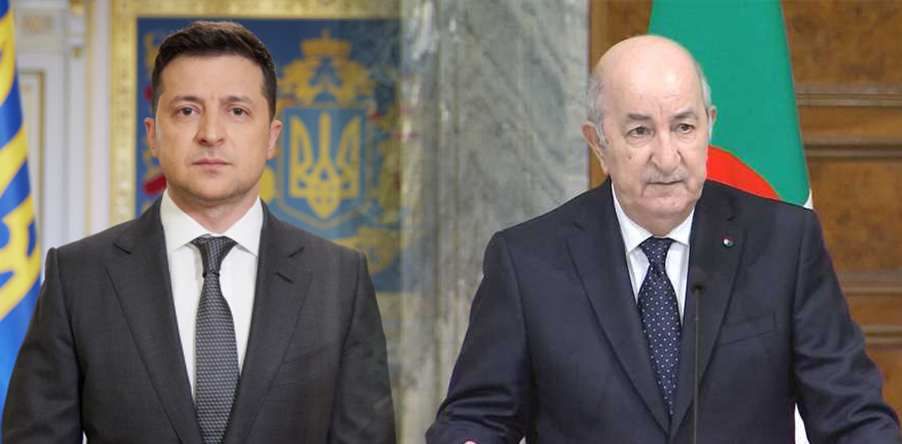On March 22, Algerian President Abdelmadjid Tebboune affirmed that his country was empowered to mediate between Russia and Ukraine, adding that Algeria is one of the few countries “with sufficient credibility to be a mediator.” This brings Algeria one step forward in the neutral position it tries to uphold in the face of the crisis situation in Ukraine, a step that was preceded by Algeria reopening its embassy in the Ukrainian capital of Kyiv.
Although Algeria’s aspiration to act as a mediator in the Russia-Ukraine crisis raises questions, it seems to be part of an attempt to secure a strategic step towards advancing Algeria’s interests, particularly in light of President Tebboune’s scheduled visit to Moscow next May.
Key considerations
It can be said that there are many considerations that encourage Algeria to seek the role of mediator in the Ukrainian crisis, the most notable of which are:
- International calls to engage in mediation efforts: President Tebboune’s remarks were made after EU Foreign Policy Officer Josep Borrell’s visit to Algeria on March 13, during which he stated that, “The European Union looks forward to Algeria throwing all its weight into resolving the war crisis in Ukraine.”
Although Borrell is the most direct, he is not the only official who called on Algeria to intervene to play the role of mediation in this regard. It seems that Russia does not seem to mind the suggestion, particularly in light of the balanced approach which Algeria has assumed since the beginning of the Russia-Ukraine war. Moreover, by fulfilling this role, Algeria can help reveal multiple perspectives to settle the conflict in a way that accommodates Russia’s interests as it faces heighted pressures imposed by Western sanctions after its military intervention in Ukraine.
Thus, the apparent “trust” in the Algerian President could perhaps be explained by the fact that his country was “empowered for mediation”, and that he would present the idea during his next visit to Moscow, which would receive special attention from Western states.
- Investing in a neutral stance between the two sides of the crisis: Algeria has always been keen to maintain a distance from the US-led axis on the international scene. However, Algeria’s rapprochement with Western countries, specifically with the US, has come through its important role in supplying intelligence and assisting in operations to combat terrorism by Al-Qaeda, and later, ISIS. Allying with the West to combat terrorism had many positive repercussions for Algeria, such as the opportunity to participate in joint military exercises with several Western countries, including the joint naval exercise with the US last September 19, which was organized by the military cooperation program between the two countries last year.
This comes as Russia is showing special interest in developing its bilateral relations with Algeria given its regional role, especially in the Sahara-Sahel. This is evident in Russia’s willingness to receive President Tebboune for a visit next May, whereby Algeria’s neutral stance has afforded it the freedom to expand its role in the international arena, and may help it to attract support for its initiative to mediate and resolve the crisis.
- The significant reliance on the energy sector: The Russia-Ukraine war has disrupted international oil and gas markets, particularly in Europe and Mediterranean countries. This has increased Algeria’s importance, not only as a gas supplier to Italy, Spain and the southern European states, but also as a major player as it is ranked as the third largest gas supplier to Europe.
What is happening in Europe has led Algeria to try to regain its influence as a Mediterranean power, based on the importance of its energy sector to Europe. Thus, Engaging in mediation efforts between parties to the Ukrainian crisis is leveraged by Algeria’s good relations with European actors, such as Italy, especially after the latter became, as of May 26, the “exclusive distributor of Algerian gas in Europe”.
The EU’s interest in developing relations with Algeria as a safe source of energy is evident by European Council President Charles Michel visit on September 5 to Algeria, during which President Tebboune met with him and discussed several issues, most notably, the possibility of supplying Algeria with more gas to Europe. This visit came 10 days after the visit of French President Emmanuel Macron, and weeks after a visit by former Italian Prime Minister Mario Draghi, which was repeated by the current Italian Prime Minister Georgia Meloni, on 24 January last. During these visits, the most important points of discussion were the war in Ukraine and the energy crisis.
- Attracting support for Algeria’s rapprochement in the region crises: For many strategic and security considerations, Algeria has shown particular interest in developments in crisis states, particularly those within their regional neighborhood, including Libya and Mali. This is reflected in Algeria’s efforts to reach settlements and resolve those crises, with a view to strengthening the security and stability situation in those states.
Policy consistency
Algeria is expected to continue to adopt this approach during the next phase, in parallel with maintaining neutrality with all parties, in order to broaden the range of options available to it in the international arena. This is leverages by strong economic ties through the energy sector with Europe, and strategic interests that intersect with Russia, especially in the armaments sector. Perhaps it can be said that President Tebboune’s next visit to Moscow next May will reveal the extent to which Algeria’s endeavours to exercise a mediating role in the Ukrainian crisis will prove successful.

